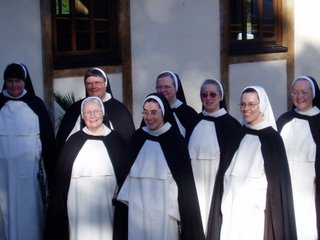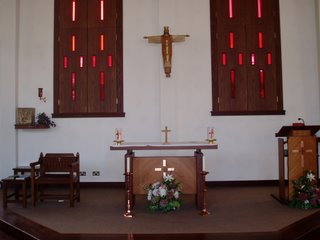Much to my surprise
Fr Benedict Groeschel was in our diocese on Wednesday to talk about Developments in Pastoral Counselling. His visit had been announced in the
Ad Clerum as a private initiative of one of our priests. It was disappointing that he was not giving an official talk to the priests of the diocese in the ongoing formation programme. About fourteen priests were present although only about half from our diocese while others came from Middlesborough, Leeds, Birmingham and even Arundel and Brighton. Most were quite young.
I set off for Stockton although I had some difficulty finding it, not having been to this part of the diocese very often, and so I arrived about fifteen minutes late. The first talk was about recent developments in psychology, a subject about which I know nothing. It appears that there has been something of a revolution in the study of pyschology. Freud is out and many of the leading pyschologists are discovering the concept of virtue and the writings of Plato, Aristotle, St Augustine and St Thomas Aquinas! Father gave us some photocopies of writings by the secular and mainly Jewish writers who are advocating these ideas. He was very entertaining on the subject of New York and the crazebetween the 60`s and 80`s for seeing an analyst . Apparently the goal of analysis was to move the patient from misery to unhappiness! Happiness was out of the question and regarded as a form of illness since how could anyone be happy given the mortal condition. His explanations at this point explained a lot about Woody Allan I thought!
In the afternoon Father spoke about types of neurosis and new approaches to counselling. Father seemed to be full of hope about the situation in the Church now. He came with three members of the community of the Franciscan friars of the Renewal, which he founded, from their new friary in Bradford. Father was full of praise for Pope Benedict whom he called a genius and one of the key figures of Vatican II. He didn`t allude to the hypothesis that Ratzinger became somewhat disillusioned after 1968 and the student revolts and changed his mind about things somewhat. At one point Father spoke about how the five greatest figures of the second half of the twentieth century were all religious figures bar one. He named them as Gandhi, Martin Luther King, Mother Teresa, John Paul II and Einstein. Even Einstein had a fascination with the Blessed Sacrament and loved to talk about it at length if he met a Catholic. I`m never that sure why John Paul II features in this kind of list and wonder whether posterity will still see him as such a colossal figure. One of the Fathers was heard to wonder (in jest) how Diana, Princess of Wales, had been missed out of the list!
All in all this was a very encouraging day and gave the feeling that things are getting back on track. He took pains to say that he did not want to turn the clock back and gave as an example how much better it was to have the office sung in the vernacular rather than as in his day when the `Deus in adjutorium` was sung three times a day in a grim mechanical way. Given that it is still possible to hear the office sung in Latin in the new rite, and that it was recommended that religious houses keep the sung Latin office, after the Council, it seemed the Council simply came down to singing things in a less grim fashion. I`m all in favour of that. I then wondered what he thought about the proposed Motu Proprio to free the classical liturgy. Altogether it was an excellent and most encouraging day.
 On Christmas Eve, we will place ourselves once again before the Crib to contemplate, astonished, the "Word made flesh." Sentiments of joy and gratitude, like in every year, are renewed in our hearts as we hear the melodies of Christmas carols, which sing of, in so many languages, the same, extraordinary miracle. The Creator of the universe, out of love, came to make his dwelling among men. In the Letter to the Philippians, St. Paul affirms that Christ, "though he was in the form of God, did not count equality with God a thing to be grasped, but emptied himself, taking the form of a servant, being born in the likeness of men" (2:6). He appeared in human form, adds the Apostle, humbling himself. At holy Christmas we will relive the realization of this sublime mystery of grace and mercy.
On Christmas Eve, we will place ourselves once again before the Crib to contemplate, astonished, the "Word made flesh." Sentiments of joy and gratitude, like in every year, are renewed in our hearts as we hear the melodies of Christmas carols, which sing of, in so many languages, the same, extraordinary miracle. The Creator of the universe, out of love, came to make his dwelling among men. In the Letter to the Philippians, St. Paul affirms that Christ, "though he was in the form of God, did not count equality with God a thing to be grasped, but emptied himself, taking the form of a servant, being born in the likeness of men" (2:6). He appeared in human form, adds the Apostle, humbling himself. At holy Christmas we will relive the realization of this sublime mystery of grace and mercy.
 I was very tempted by a black Roman chasuble with a winged coffin and crossed scythes but managed to overcome temptation and settle for a new plain gold Roman vestment which will be useful for many major feasts.
I was very tempted by a black Roman chasuble with a winged coffin and crossed scythes but managed to overcome temptation and settle for a new plain gold Roman vestment which will be useful for many major feasts.






